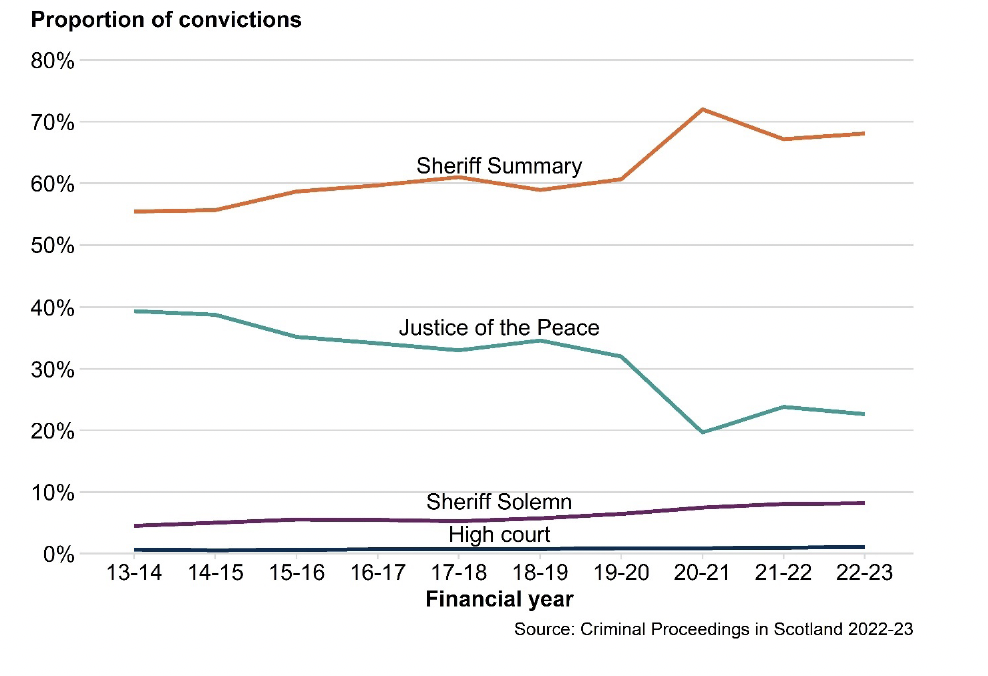Criminal Proceedings in Scotland, 2022-23
Statistics on criminal proceedings concluded in Scottish courts and alternative measures to prosecution issued by the police and the Crown Office and Procurator Fiscal Service are presented for the 10 years from 2013-14 to 2022-23.
4. People convicted in court
(Table 3)
There are four main court types that deal with criminal cases in Scotland.
- The High Court, which deals with the most serious crimes such as murder, rape and armed robbery. Murder convictions carry a mandatory life sentence and the maximum penalty that may be imposed in the other cases is up to life imprisonment and/or an unlimited fine. The exact maximum in a given case will be determined by any limit provided for in law for the offences being prosecuted. A single judge hears cases with a jury of 15 people. The jury reach a verdict, and if a conviction arises, the judge determines sentence.
- Sheriff Courts, which deal with the majority of cases in Scotland. These can either be solemn, where the Sheriff sits with a jury of 15 people or summary, where the Sheriff sits alone [note 1]. For solemn cases, the jury reaches a verdict and, if a conviction arises, the Sheriff determines sentence. The maximum penalty for solemn cases is five years’ imprisonment and/or an unlimited fine. For summary cases, the Sheriff reaches a verdict and, if a conviction arises, determines the sentence. The maximum penalty that may be imposed (in most circumstances [note 2]) is one year’s imprisonment and/or a £10,000 fine.
- The Justice of the Peace courts. These deal with the less serious crimes, such as speeding, shoplifting and certain types of breach of the peace. They are chaired by a Justice of the Peace or “lay magistrate” who has been appointed from the local community and trained in criminal law and procedure. They can impose custodial sentences of up to 60 days and fines up to £2,500.
High-level summary
People Convicted in court
(Tables 3)
- 68,067 people were convicted in a Scottish court in 2022-23
- 68% of these were convicted in a sheriff summary court
Year on year change (2021-22 to 2022-23)
There was an increase between 2021-22 and 2022-23 in the number of people convicted in each court type:
- High court convictions up 30% to 733
- Sheriff solemn court convictions up 17% to 5,563
- Sheriff summary court convictions up 16% to 46,340
- Justice of the peace court convictions up 9% to 15,431
Change over the latest 10 years (2013-14 to 2022-23)
- There was an overall decrease of 36% in the number of convictions from 2013-14 to 2022-23. Over the same time period:
- High court convictions have risen by 4%
- Sheriff solemn court convictions have risen by 17%
- Sheriff summary court convictions have fallen by 21%
- Justice of the peace court convictions have fallen by 63%
Key points to note
- The majority of convictions have taken place in a sheriff summary court every year since 2013-14. The proportion of sheriff summary court convictions has risen from 55% in 2013-14 to 68% in 2022-23
Chart 5 shows the changes in the proportion of convictions seen in each court type since 2013-14.
Please note that recording delays are typical for High Court activity due to the complex nature of cases held there. As a result, the total number of High Court convictions for 2022-23 may be slightly underestimated, and will likely be revised upwards in the 2023-24 bulletin. More information is available in the Annex revisions section.
Notes for Section 4. People convicted in court
Note 1. In a Sheriff Solemn court, the jury determines whether an accused is guilty or not and the Sheriff determines sentence. In a Sheriff Summary court, the Sheriff determines both whether an accused is guilty or not and, if guilty, the sentence.
Note 2. The court can sentence up to an additional six months where there is a bail aggravation on the charge, and Sheriff Court fines can be higher than £10,000 where there is legislative provision for this in relation to a specific offence.
Chart 5. Over the long term the proportion of convictions made in Justice of the Peace courts has declined, with all other court types proportionally increasing.
Proportion of convictions by court type, 2013-14 to 2022-23.

Contact
Email: justice_analysts@gov.scot
There is a problem
Thanks for your feedback